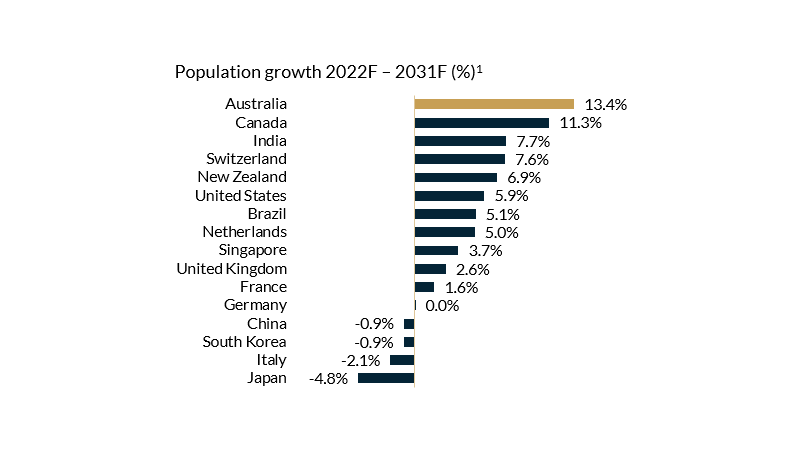The housing supply and demand imbalance... and how to play it
The current size of the private credit real estate market is estimated to be $432 billion.
Such scale has come about because “private lenders are able to provide solutions to property investors and developers that aren't otherwise available”, says Mark Power, Head of Income Credit at Qualitas.
Following the GFC, the Australian Prudential Regulation Authority (APRA) took measures to ensure the health of the banking system. One of which was to reign in the risk appetite of the major banks with respect to commercial real estate.
“That was enforced upon the banks by virtue of some rigorous capital provisioning models that run through the traditional financing system these days.
And that was consistent with the changes that were being made globally through Basel I, Basel II, or more recently through the Basel III capital provisioning regimes”, says Power.
Ultimately, the banks have been forced down the risk curve and that has created a gap for private lenders to provide flexible financing solutions. Comparing the size of the market to other geographies, the US banking system provides about 40% of commercial real estate lending. In Australia, that number sits at 74% (down from 86% ten years ago).
“This is a sector experiencing rapid growth but we think there’s a lot more growth ahead if we’re to get to a position where the private lending market in real estate is more consistent with what you see in the US”.

As part of Livewire’s 2023 Income Series, I discuss with Power his views on interest rates and the property market, some of the unique and critical features of Australian property, and where Qualitas is investing right now.
A view on interest rates and the property market
Qualitas’ view is that the RBA is approaching the top of the hiking cycle, “but there's a little bit more to go”, says Power.
He adds that there are potentially another 50 basis points of increases and that the RBA has not gone too far.
“Inflation, when it occurs, is viral, it essentially runs through your society and it creates all sorts of inequalities, particularly for those at the lower end of the socioeconomic spectrum.
It's absolutely critical to break inflation and break that early on because if you don't break it early on it becomes entrenched and then as we found back in the 70s and 80s, it's very difficult to try and get under control”.
When it comes to the property market broadly, Power sees the next 12 months as being “patchy”.
“Certain sectors are going to perform quite well and other sectors are going to be reasonably challenged. It will largely depend on how those sectors are reacting and how sensitive they are to the increasing interest rate environment, what that means for cap rates in different sectors, and perhaps most importantly, the ability of that income stream to adapt to the inflationary environment”, says Power.
But there is one factor that will provide support across the board and that is migration.
“Migration has come roaring back and it's an absolutely critical part of the Australian property market.
It's underpinned the market here for a long period of time and continues to”.

Power notes that migration figures for the year until May were north of 500,000, which is beyond what it was pre-GFC.
And whilst some of it might be seen as people making up for the lost time during COVID, “the projections for migration and population growth are still very robust over the course of the next two years - we're talking potentially another 900,000 over the next two years”, adds Power.
“The reason why it’s so important for the Australian property market is that it creates demand.
As Power rightly points out, “These people have to live somewhere, they have to work somewhere, they have to shop somewhere. This generates demand for real estate and that's increasingly evident in the residential market”, he adds.
Supply and Demand
As well as the demand imbalance which Power speaks to, he points out that right now the residential property market is in deep undersupply.
“The residential vacancy rate is in the low 1% across the eastern seaboard. A market in equilibrium is a vacancy rate of about 3%. So you're already starting deeply undersupplied and you're seeing that in the rental market at the moment”.
Power adds that the supply forecasts over the next 2-4 years are at decade lows.
“You've got this massive disconnect. In the 34 years that I've been doing real estate financing, I've never seen such a demand/supply disconnect in any given market”.
When pressed about such an imbalance and the potential for solutions, Power adds that he can’t see the situation being fixed anytime soon.
“This isn't a two- or three-year story, this is a decade-long story”.
It’s also a major part of the reason why Qualitas has tilted its portfolio to residential property.
Why private credit?
Whilst the supply/demand imbalance in the residential property market will create a host of opportunities, Qualitas’ remit is private credit.
Power notes that private credit “is still a good place to invest in a rising interest rate environment because you're in debt, and the rate hikes get passed straight through to the investor in terms of greater return”.
The debt side of the property market is very different from the equity side of the property market. Power notes that higher rates aren’t particularly good on the equity side given that they place pressure on cap rates, which places pressure on valuation.
“Whereas if you're investing in the credit or the debt part of the capital structure, as interest rates increase you're essentially getting first claim on cash flow coming out of the assets”.
How is Qualitas investing?
As has already been noted, Qualitas has tilted towards residential property in the current market environment. Power says that is because of residential property's ability to make adjustments to the income stream being generated.
“Residential is a great example, where you've got strong rental growth on the back of inflation and residential rents are generally set every 12 months or thereabouts.
Power notes that industrial is another area of interest, given the current conditions.
“Industrial was brought down to very sharp valuation levels prior to this increase in interest rates and ordinarily you'd see an increase in rates and significant expansion in cap rates could then impact negatively on values.
But what we are seeing is strong rental growth in that part of the market and that strong rental growth is offsetting the increasing cap rates so that those industrial assets are holding their value nicely”.
The tilt towards residential has come at the expense of commercial office investment. And whilst Power notes that Qualitas still selectively takes on commercial office projects, they are becoming increasingly selective.
“Commercial office is really challenged at the moment. You've got high levels of existing vacancy, which is largely a function of the work-from-home/work-from-office, hybrid environment and what that then means for longer-term demand for office.
“In that environment with heightened vacancy and soft demand, you're not getting that rental growth in that sector. If anything, rentals are under pressure, but you've still got that cap rate expansion on the back of increasing interest rates”, says Power.
What do you look for in a property/development?
Power notes that Qualitas is looking for both “best of breed developers and the best of breed property”. Qualitas is able to be so selective given its 15-year history in the industry and strong track record. The business only does 40-50 deals per year according to Power, despite the hundreds of potential investments that are made available to it.
When it comes to the property side of things, Power says “We're looking for those that are well located and service their market really well”.
“You want to have good amenity within the property, you want great amenity in the surrounds of the property. You want strong connectivity to public transport and – for high density - you want it to be in the inner suburban rings of the major cities up the eastern seaboard”.
Power adds that Melbourne and Sydney are major investment areas for Qualitas, whilst investment has been increasing in Brisbane.
When it comes to the actual buildings, Power adds that they must be very well-designed and future-proofed as much as possible.
"We're looking at the investments we're making through a strong ESG lens, particularly around sustainability. We want to make sure that the properties that we're funding and that we're delivering are designed to reduce the amount of carbon they're emitting as much as is commercially possible”.
Pricing deals accordingly
In a paper published in March this year, the RBA broadly declared that “non-bank lending is riskier than bank lending, on average”.
And whilst Power doesn’t refute this claim, he adds that in the case of Qualitas, it comes down to the expertise and different structures that the business employs to manage that risk.
Power adds that the types of borrowers Qualitas is lending to are the same borrowers that the banks are lending to in many cases, and that the banks have been forced to be more conservative by APRA.
He goes on to say that whilst previously developers having a relationship with a private lender was a nicety, it’s now a necessity.
“Developers these days are saying ‘my traditional banking relationship is really important to me, but it's absolutely critical that I have strong relationships with private lenders as well’, because they've recognised that that sector can provide a lot of solutions for them that their traditional financiers no longer can. And whilst the lay of the land has changed, Qualitas will only provide lending on investments “that we can appropriately structure to mitigate that risk that we're taking on board”, says Power.
“We look at each investment on its merits, look at the structures and the risk mitigants, and then on the back of that, what's the appropriate price to bring that risk on board?”
How can investors access commercial real estate private credit?
The asset class can be invested in through listed or unlisted vehicles. The Qualitas Real Estate Income Fund (ASX: QRI) is an example of a listed pure-play CRE credit fund which has a Mortgage Real Estate Investment Trust (MREIT) structure. MREITs are companies or trusts that service, originate, purchase and/or securitise commercial and/or residential mortgage loans. The MREIT structure provides access for retail investors to a previously illiquid asset class with the expertise of an institutional investment manager with multi-cycle experience via the ASX. The structure also provides liquidity in what would otherwise be a close-ended ended structure, meaning the manager doesn’t have to force sale assets to fund redemptions and can focus on investment selection and portfolio management. Learn more about the fund here.
More from Income Series
- Private Credit: a smart choice
- How we are meeting property developer demand in the age of the "slow no"
- We've returned 9.6%* pa to investors without sacrificing on security. Here's how we do it
- Where to find defensive investment returns as macro volatility persists
- Income Series: View the list of 22 Managed Funds, LITs, LICs & ETFs
4 topics
2 stocks mentioned
1 contributor mentioned


